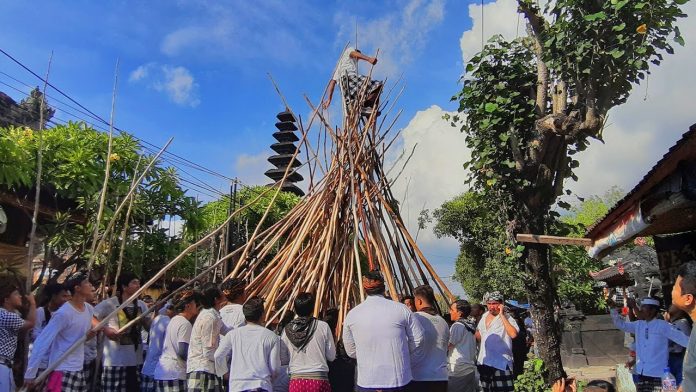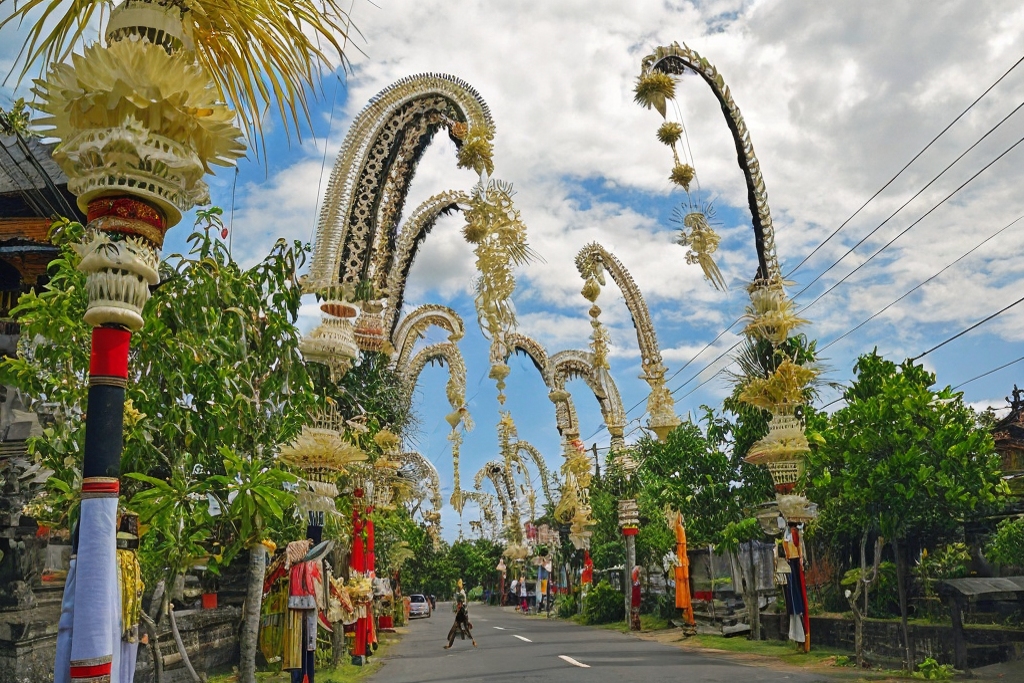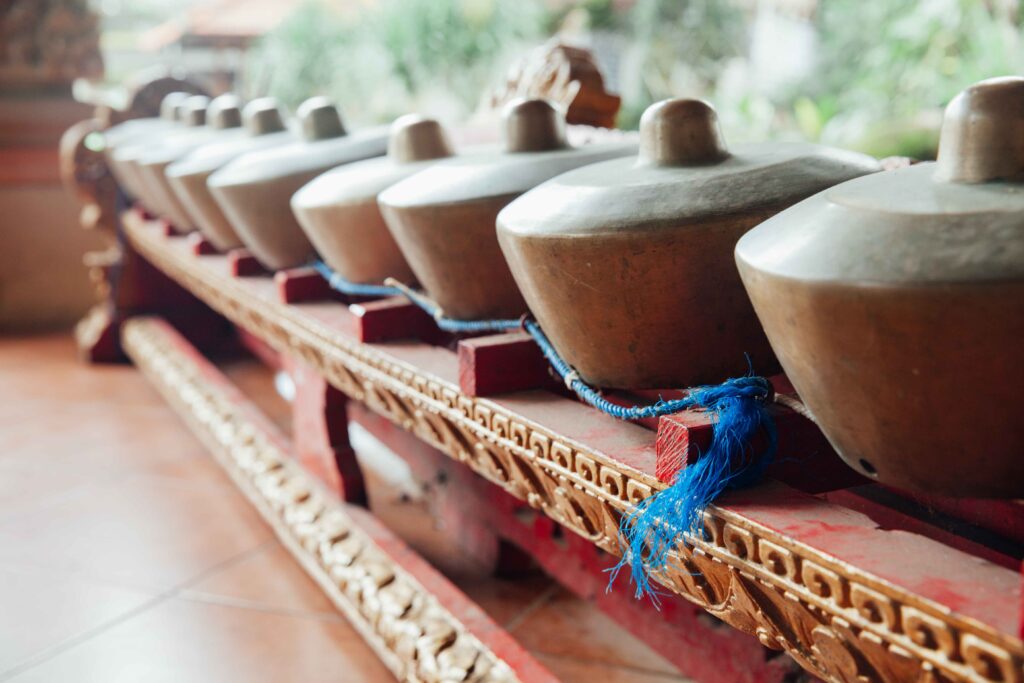Munggu village is one of the amazing Balinese villages in South Bali with its charming natural beauty, endless rice fields, peaceful beaches, and friendly locals.
However, it is not all that it is to this little corner of the island. It carries one of the oldest and unique traditions in Bali, which is not performed anywhere else – Mekotek.
Here is our complete guide to understanding this ritual and a quick glimpse into what to expect from attending the ceremony.
What Is Mekotek?

Mekotek is a Balinese Hindu ritual happening on Kuningan holiday when villagers assemble wooden sticks in a towering pile to ask the Gods for protection from bad luck.
Mekotek tradition started in Munggu village in Badung Regency, Bali.
The name “mekotek” comes from the Indonesian word “tek”, which is how they describe the sound the poles hitting each other make, and the Balinese word “kotek,” which literally translates to “long wooden pole”.
This ceremony is also known as Mekotekan, Gerebeg Mekotek, or Ngerebek.
In 2016, the Mekotek tradition was officially included in Indonesia’s Intangible Cultural Heritage.
History of Mekotek Tradition: From The Mengwi Kingdom To Modern Bali
The Mekotek tradition is deeply rooted in times when Bali and Java were two different kingdoms going through several conflicts.
Soldiers from all over Bali, including the Mengwi Kingdom on the South coast of the island, would travel to East Java to fight with the Blambangan Kingdom’s army.
To celebrate their victorious return home, the whole village would come out for a celebration – Mekotek and greet soldiers with real metal spears and music. It was believed to cultivate the spirit to fight and resist.
It was forbidden in 1915 during the Dutch colonial rule, as the authorities were too scared of armed groups starting a rebellion, but the Mengwi district later reinstated the tradition, as too many diseases were spreading, and the Mekotek tradition was believed to stop that.
When Is Mekotek?

The Balinese calendar has 210 days, and every 6 months, Hindus celebrate a big 10-day holiday: Galungan and Kuningan.
On Galungan day, Balinese families welcome the spirits of their ancestors into their family houses and spend 10 days with them, until the Kuningan day.
The Mekotek happens on Kuningan day, too, every six months, which always falls on Saturday, and the day is called Saturday Kliwon Kuningan.
Mekotek: How Does It Work
The Wooden Sticks

Today, Mekotek participants don’t use real spears; the villagers use 2.5 or 3-meter-long wooden sticks made of pulet wood (wood pellets) or bamboo and pile them up in a pyramid shape, holding them in their hands and interlocking the tops of the poles.
All the men need to be united, agile, strong and work together so the whole structure stays intact even when they move.
At the top end of the stick, they attach some offerings and leaves.
When many villagers are joining – sometimes thousands, the procession will have to be divided into groups and each will make their own pyramid accompanied by music and priests, or it will be decided that there will be just one towering cone of sticks.
Gathering At The Pura Dalem Temple

The ceremony begins at the Munggu Temple Pura Dalem Munggu, where all the villagers from 12 to 60 come dressed in traditional Madya attire: headpiece udeng, shirt, and sarong camben for men, and dress or shirt kebaya, sarong camben, and a little belt bulang for women.
Usually, mostly men participate, and everyone brings a pole or a skinned branch.
At the temple, Balinese priests and people send prayers asking for safety and expressing gratitude to the Gods for keeping the village well and prosperous.
Procession Starts
Right after that, the whole procession will head to a Holy water source, it can be a holy spring, river or the ocean itself at the Munggu Beach.
The procession will be divided into several groups. First, there are people forming a pyramid with the sticks in their hands!
Yes, it is a whole challenge to walk down the streets with maybe 50 other men, trying to hold the long sticks up in the air, sticking together!
On their way, they will pass by a priest who will bless them with a splash of holy water on their head and a little bit of water in their palm to clean their mouth (always a part of the ritual before entering holy grounds or participating in a ceremony in Balinese Hinduism).
Traditional Music

The group is followed by musicians playing traditional Beleganjur gamelan music.
The sounds of these percussion instruments, poles, and the parade aim to ward off all the bad luck, sickness, and disasters.
Some men not playing instruments will carry Balinese umbrellas, flags, and penjors – spiritual symbols of protection.
Towering Pyramids On The Streets
When there is an intersection on the way, men will go in circles, just like it happens during the Ogoh Ogoh festival, to confuse and misguide the evil spirits.
The different groups of men with pyramids will also try to clash, imitating the war conflicts their ancestors took part in.
There will also always be a couple of very brave (and agile) boys or men who will attempt to climb to the very top of the piling sticks like a chieftain giving commands – an example of Balinese resilience, fearlessness, and courage.
Things To Know About Visiting Munggu Village During Mekotek

On the day, the whole main street will be blocked for the ceremony, you will need to find a place to leave your bike or come by taxi.
You will be able to walk along the procession, but always be respectful of the culture, and dress appropriately.
Usually, Balinese are very friendly, but it is best to ask permission if you want to snap a few photos.
The event doesn’t actually take the whole day. Neighbours gather at the temple, pray, and march, so make sure not to miss it!
Women don’t carry sticks or participate in the pyramid formation, but they are more than welcome to follow along.
Be cautious. The long sticks often reach the electric cables, and while Balinese learned how to navigate the streets, cables can snap. And certainly, don’t attempt to climb the pyramids.
Final Thoughts On Mekotek Tradition
Modern Mekotek still has the significance of honouring the military accomplishments of the ancestors – sticks, and adds another spiritual aspect of faith, unity, and God’s protection to it.
Balinese are exemplary keepers of the tradition and history of their people, proudly offering everyone a glimpse into this mystical world.
If you’re lucky to be in Bali for Kuningan day, make sure to make a trip to Munggu village to witness this tradition first-hand!
Related blogs:












